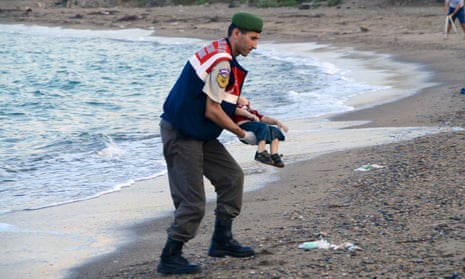A Turkish police drano carries a young boy who drowned in a failed attempt to sail to the Greek island of Kos. First published on Wed 2 Sep 2015 15. The picture, taken on Wednesday morning, depicted the dark-haired toddler, wearing a bright-red T-shirt and shorts, washed up on a beach, lying face down in the surf not far from Turkey’s fashionable resort town of Bodrum. A second image portrays a grim-faced policeman carrying the tiny body away.
Turkish media identified the boy as three-year-old Alan Kurdi and reported that his five-year-old brother had also met a similar death. Both had reportedly hailed from the northern Syrian town of Kobani, the site of fierce fighting between Islamic state insurgents and Kurdish forces earlier this year. This tragic image of a little boy who’s lost his life fleeing Syria is shocking and is a reminder of the dangers children and families are taking in search of a better life. This child’s plight should concentrate minds and force the EU to come together and agree to a plan to tackle the refugee crisis. Greek authorities, coping with what has become the biggest migration crisis in living memory, said the boy was among a group of refugees escaping Islamic State in Syria. Turkish officials, corroborating the reports, said 12 people died after two boats carrying a total of 23 people, capsized after setting off separately from the Akyarlar area of the Bodrum peninsula.

Among the dead were five children and a woman. Seven others were rescued and two reached the shore in lifejackets but hopes were fading of saving the two people still missing. A Turkish police officer stands next to the body of the young boy. Photograph: Reuters The casualties were among thousands of people, mostly Syrians, fleeing war and the brutal occupation by Islamic fundamentalists in their homeland.
Kos, facing Turkey’s Aegean coast, has become a magnet for people determined to reach Europe. Some 15,000 refugees are in Lesbos awaiting passage by cruise ship to Athens’ port of Piraeus before continuing their journey northwards to Macedonia and up through Serbia to Hungary and Germany. Ketty Kehayioy, the UNHCR’s spokeswoman in Athens told the Guardian. The absence of staff to conduct registrations is creating enormous bottlenecks on Lesvos and Kos which is further exacerbating substandard conditions, conditions themselves worsened by very limited facilities. Wednesday’s dead were part of a grim toll of some 2,500 people who have died this summer attempting to cross the Mediterranean to Europe, according to the UN refugee agency, UNHCR. Athens’ caretaker government, in power until elections are held on 20 September, announced emergency measures to facilitate the flow after meeting in urgent session under the prime minister, Vassiliki Thanou. The migration minister, Yiannis Mouzalas, said the measures would aim to improve conditions both for refugees and residents on islands such as Kos and Lesbos.
Conditions on islands have become increasingly chaotic with local officials voicing fears over the outbreak of disease amid rising levels of squalor. Mouzalas, a doctor who is also a member of the Doctors of the World aid organisation. The UNHCR calculates that some 205,000 Europe-bound refugees have entered Greece, mostly via its outlying Aegean isles, this year alone. Iraqis and Somalis fleeing conflict in their countries.